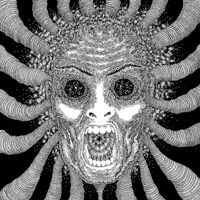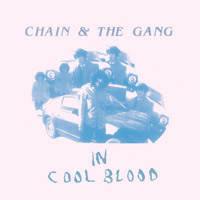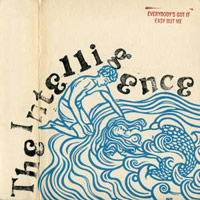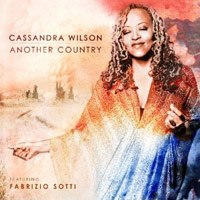
Slaughterhouse
In the Red
It seems like I am writing about Ty Segall more often than I get a haircut, which admittedly may not be as often as it should be. The San Franciscan guitarist and yalper has been churning out records at an alarming pace, with the quality rarely dipping below fucking righteous. Meanwhile, his popularity has seemingly soared in direct relation to his prolificness.
After a collaboration earlier this year with White Fence, Slaughterhouse is the first record credited to the Ty Segall Band, which is comprised of the cream of Segall’s collaborators, namely Mikal Cronin, Charlie Moonheart, and drummer supreme Emily Rose Epstein. The reason for the change in accreditation becomes immediately obvious once one gets a load of the album. Unlike past records where Segall worked in the studio on his own, playing all parts and piecing each song together bit-by-bit, Slaughterhouse is the effort of a band recording live to tape. As such, it is rougher and woolier, with Segall and his crew falling back on rockist tendencies rather than pushing for the kind of grungy pop epiphanies on which Ty has made his name. As such, this is a record of few dimensions; it veers between noisy, noisier, and pretty god damn noisy. “I Bought My Eyes” is the lone instance where Segall and his band seemingly spontaneously transcend such rote penchants for the higher ground of melody. “Mary Ann” uses such primitivism to its advantage, though, the song’s fuzz rumble propelling it along its short path to bliss. But as made clear on “Diddy Wah Diddy,” Segall has allowed his most simplistic instincts to run wild, which might work in loose settings (i.e. beach party, basement stoner session, SXSW wing-ding), but on wax, it leaves something to be desired. I’m certainly not writing Ty off yet—he no doubt recorded this in about the time it takes to listen to it—but I’ve heard him do better, and not that long ago.
Stephen Slaybaugh
MP3: “Wave Goodbye”

In Cool Blood
K
Who could write a funky R&B jam about archaic trash that isn’t found in bins anymore? Or how about a song with lyrics about having already said before what was to be said? Leave it to Ian Svenonius—the Psychic Soviet, the maven of anti-political politics and local nationalism, the Miss Manners of polite punk procedure—to glom together with another group of like-minded good folk fed up with the regular humdrum of pop and “underground” music nowadays.
In Cool Blood is Chain & the Gang’s third long-player. You could deduce from the title of the record that the band is well-versed in literary allusion, adept with turn of phrase, and satisfied with the concise description. Svenonius and crew use “cool” in the same way Capote used “cold”: figuratively, not referring to temperature but to temperaments, an aesthetic of individuality, and being able to proclaim that you “don’t believe in free will,” or in other words, “just do what you feel” (“Free Will”). Really, everything about this band is “cool.” The guitar sound rivals Marc Bolan’s, the drums sound like they could have come off a Booker T cut, and the bass thwips and thumps like Chocolate Watchband or the Troggs. Then we have Svenonius’ vocals, which at this point, after Nation of Ulysses, the Make Up, Scene Creamers, Weird War, his Vice internet chat show, and the rest, have become an iconic singularity, surpassing Jonathan Richman’s ability to jazz up the mundane while keeping a purposeful exclusiveness from mainstream relevance. Some songs are a stretch to believe, like how a few of the concepts in Svenonius’ writing drift away from the agreed upon American liberal, democratic punk ideal and into challenging political areas. However, as with nearly all of his material, he manages to tie up the ends logically and clearly into a hard truth reality that eschews the public’s frivolous hoping and wishing for officials to heed the call of the masses. Chain & the Gang is an exercise in this exclusivity—the last album was called Music Isn’t For Everyone—but not exclusivity of which you can’t be a part. You just have to listen to the Chain & the Gang. Luckily, the band makes it an easy listen and has yet to cut a boring slab of wax.
Michael P. O’Shaughnessy

Valley Tangents
Drag City
Lea Cho and Russ Waterhouse deal strictly in spirit music. That, of course, is an easy way out to describe what they do, but what the duo composes blurs many of the lines between psych, jazz, and new age. As such, it’s best to stick with a tag as amorphous as their tunes. On the back of Valley Tangents reads a slogan that states this is “cosmos in the cupboard,” which is pretty much the modus operandi of Blues Control: two souls working with animal parts and mystical elements to conduct miasmic warps into a space the size of the human skull. They once called a record Puff, which should very much be interpreted as instructions on how to fully enjoy a Blues Control performance. The same ritual should still apply to Valley Tangents, only now some of the results might leave one terrified, blissfully comatose, or simply nonplussed. The belly of the album is, in a word, wispy. Dynamics once heard go missing on “Walking Robin,” which sounds waterlogged in ambient nonsense. You’re not going to find structure or a linear guide on “Open Air,” but that’s fine if you’re looking for stoned metaphysical wonders deep beyond your speakers. I’d like to think of Valley Tangents’ fever dreaming center as more a respite, perhaps a cleansing, that brings a counter to the monstrous bookends which are deceivingly transformative for Cho and Waterhouse.
“Love’s a Rondo,” is complete shape-shifting for Blues Control. Per usual, Cho’s piano chops lead the charge, skittering through melodies that range from Vince Guaraldi to Joe Zwainful and Monk. But the kicker comes in Waterhouse’s penchant for fusion. His guitars here could double for something lifted from Return to Forever or Mahavishnu. These unexpected textures are almost jarring to a fault, soon though that incongruence mellows into a bubbling ascension. Equally craggy is the presence of digi-brass on the next song, “Iron Pigs,” making one wonder if by “tapes,” Waterhouse implies using No Limit cassingles as his principal inspiration here. Still, the blaring presence of faux-pomp is eradicated with a jam that follows Cho further down the rabbit hole. All of this eventually builds to the closer, the eight-minute “Gypsum.” The song is an epic in itself, using all of the strange fragments heard before and having them coalesce into an album-ending mantra that suggests Blues Control are closer to A Love Supreme than disposable kitchen-sink psych. Sure, there’s plenty of meddling on Valley Tangents, but meddling, in the case of Blues Control, is what leads them up the mountain. This is spirit music of the highest order.
Kevin J. Elliott
MP3: “Iron Pigs”

Everybody’s Got It Easy But Me
In the Red
Lars Finberg’s Intelligence has always been one of the more curious bands on the contemporary underground’s punk/post-punk axis. With his credentials in tact as a drummer for The Intelligence’s sister band, the A-Frames, Finberg has charted a distinctive course en route to his singular destination, a route filled with analog synth waves both new- and no-, fidgety guitar riffs, and oddball pop melodies. Everybody’s Got It Easy But Me is the eighth full-length in the band’s roughly decade-long existence, and like previous efforts, it’s immediately striking, and with a little bit of effort, quite likable.
While there’s plenty of pure punk energy here, The Intelligence’s heart truly lies with the goofball freneticism of Devo and early B-52s, as well as the conceptual grandeur of Sparks. Look, nobody likes the word “quirky”—that’s understood—but there aren’t many appropriate synonyms for an artist that spends a full minute and thirty seconds of a song literally counting to fifty, as Finberg does on the album-opening “I Like LA” (perhaps an ode to the town to which he recently relocated from the Pacific Northwest). Once this numerical sidebar is complete, Finberg introduces his band and they slide back into the song’s minimalist groove. It’s an eccentric move if nothing else (there you go, we’ll go with “eccentric”).
Yet for all of the easy talk of how unusual Finberg and The Intelligence can be, there are numerous moments of pure, blissful pop here. There’s nothing odd at all about “Little Town Flirt,” other than the fact that such a perfect homage to Nick Lowe’s own perfect homages to classic rock & roll would appear on an album like this one. Then again, eclecticism is very much a part of The Intelligence game, and such a relatively straightforward pop tune actually underscores the funhouse-mirror melodies that comprise the rest of the record.
It’s hard to say whether Everybody’s Got It Easy But Me ever coalesces into a cohesive whole, and the two six-minute tracks that close the album (the droney PIL-inspired “Sunny Backyard” and the ambrosial “Fidelity”) could have probably each shared a side and kept a nearly perfectly balanced album in tact. Yet by the time the gentle female chorus of the latter sweeps the listener away, it’s clear a complete journey has taken place. It might not always make sense along the way, but that’s exactly what is enjoyable about this quirky and eccentric band.
Nate Knaebel

Another Country
eOne
On her ninth album since breaking out with New Moon Daughter on Blue Note in 1995, Cassandra Wilson, now 56, turns to a new label and a new-ish sound. Don’t worry, she’s still got the deepest and shmoov-est vocal style this side of Sade. What’s new is the intimacy of her collaboration with her songwriting partner, guitarist and producer Fabrizio Sotti. Another Country plays out as a dialogue between the pair as they explore the many ways her voice and his guitar can combine.
Much of the record veers between the Italy-by-way-of–New Orleans sound, complete with accordion and claves and the hot jazz guitar vibe, with brushes on the drums, and plenty of noodling by Mr. Sotti. However, it also gets plenty mellow on “Letting You Go” and “Deep Blue,” the two instrumental tracks. “Another Country” is the best lyric on the album, though Sotti mostly blends with the band in this case. One of Wilson’s most memorable early recordings for Blue Note, “Sankofa,” based on a Ghanian proverb, is recalled by “Olomuroro.” It’s based on a West African folktale, and here the duo enlists children’s voices to echo the refrain of “Where is your mama? Where is your papa?” It’s a startling contrast to the rest of the album, and I wish she’d do more songs like that.
Much of the subject matter of the record is scattered and vaguely romantic, but a strong narrative works its way through the first few tracks. On “Red Guitar,” Wilson sings about blue water, white linens, black coffee, pink glasses and yellow roses, then she plays her song “on red guitar.” Cue guitar solo. It’s a fitting intro for this guitar-driven record. On the follow-up, “No More Blues,” she sings, “Left my home, miss my friend, but I’m starting over ’cause I don’t want no more blues.” It's a mellow, lithe declaration of independence.
Matt Slaybaugh
ALBUM REVIEWS
Magic Trick, Ruler of the Night and Wymond Miles, Under the Pale Moon
Rebecca Gates and the Consortium, The Float
SpaceGhostPurrp, Mysterious Phonk
B. Dolan, House of Bees Vol. 2
Guided By Voices, Class Clown Spots a UFO
The Young, Dub Egg
Wintersleep, Hello Hum
Beak>, >>
The Ready Stance, Damndest
Patti Smith, Banga
Crocodiles, Endless Flowers
Public Image Ltd, This Is PiL
Cadence Weapon, Hope in Dirt City
Human Don't Be Angry, Human Don't Be Angry
